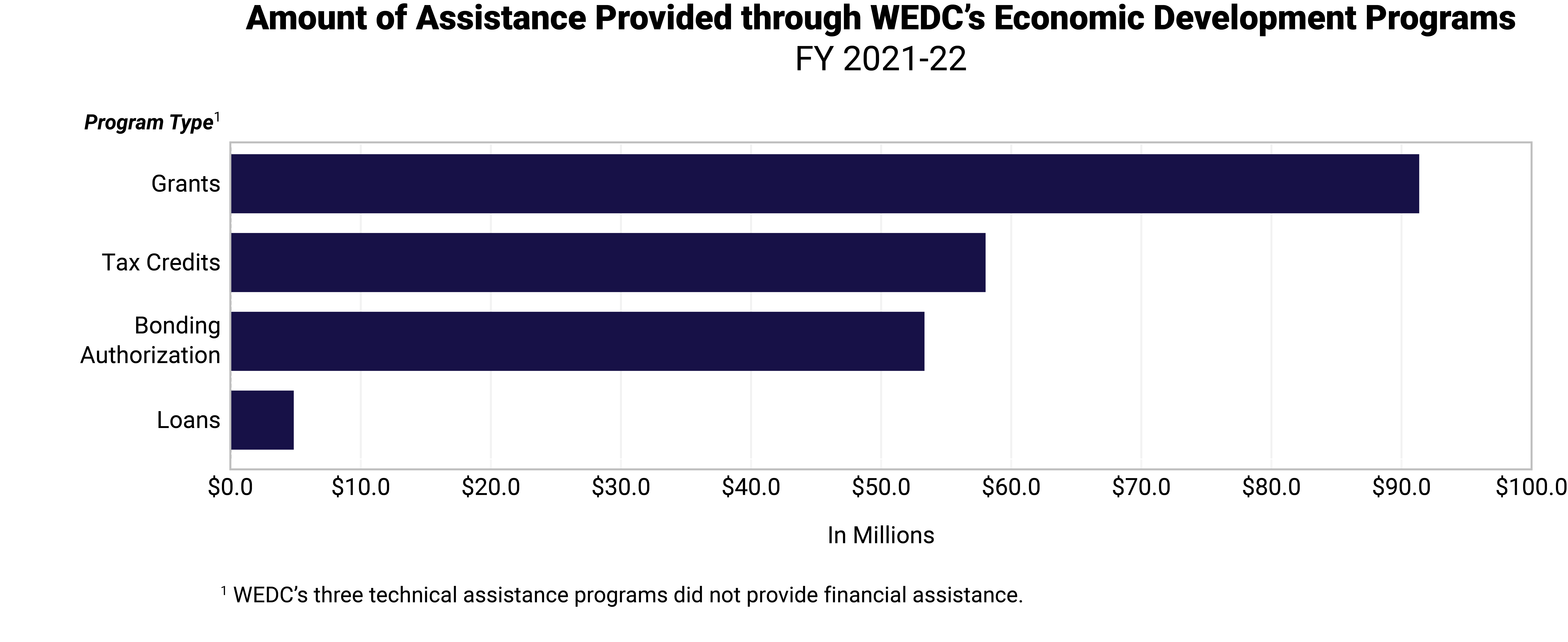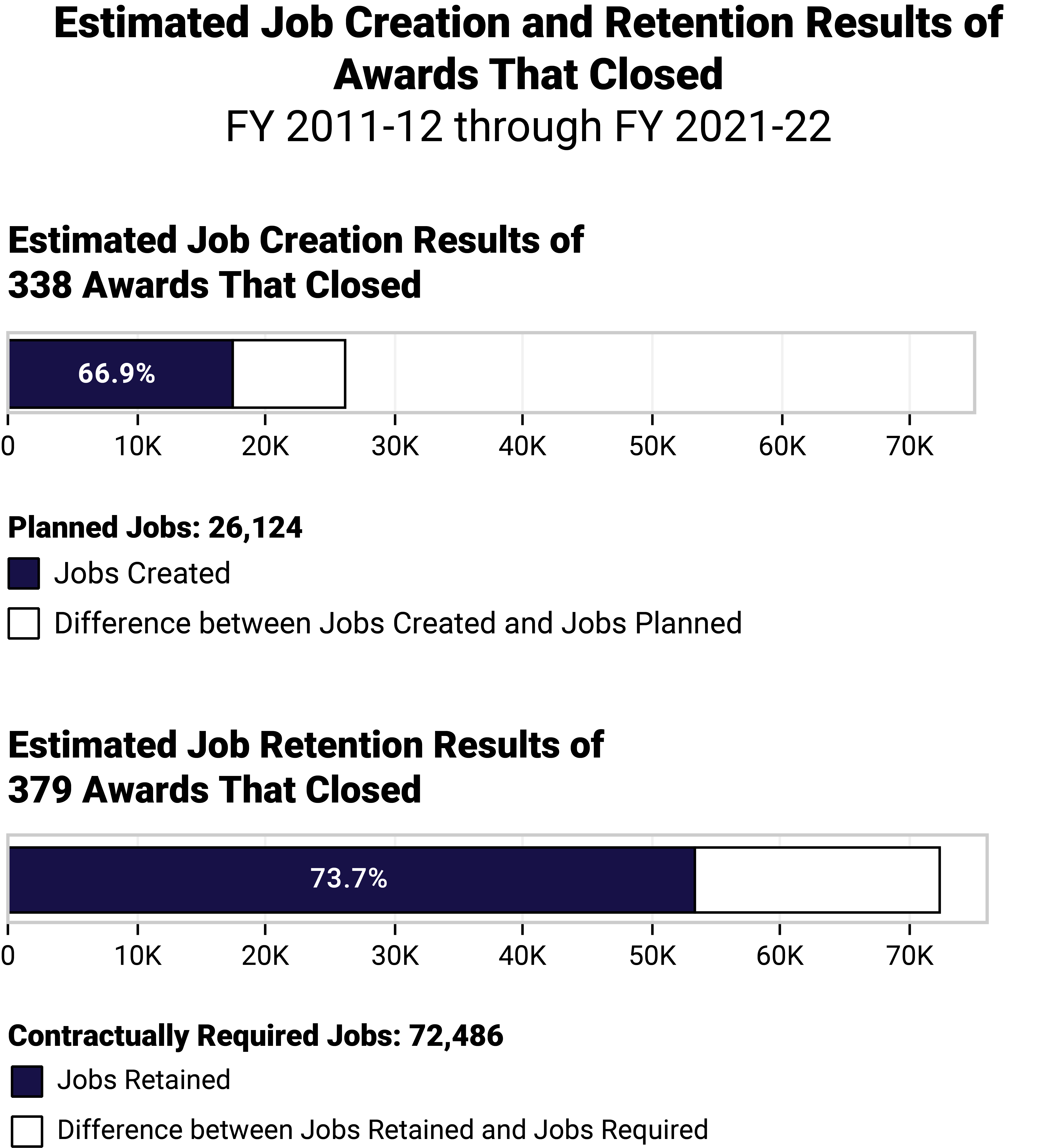The Wisconsin Economic Development Corporation (WEDC) has been Wisconsin’s lead economic development organization since fiscal year (FY) 2011‑12. Section 13.94 (1) (dr), Wis. Stats., requires us to conduct biennially a financial audit of WEDC and a program evaluation audit of WEDC’s economic development programs. This is our sixth biennial audit of WEDC.
We found that WEDC did not comply with its policies because it did not post on its website the approved minutes of the meetings of its governing board or board meeting materials after the meetings occurred. WEDC’s procedures for awarding tax credits did not consistently comply with statutes, five grants totaling $50,000 were made to ineligible recipients through a program supported by supplemental federal funds, and eight grant recipients were not required to repay $64,300 in supplemental federal funds that had been used to cover expenditures that were incurred outside contractually specified time periods or not verified. WEDC did not revoke $2.6 million in tax credits, even though these recipients did not meet their contractual obligations, and its online data continued to contain inaccuracies. We make recommendations for improvements.
WEDC allocated tax credits, awarded grants and loans, and authorized local governments to issue bonds through its 30 programs in FY 2021-22.
From December 31, 2020, to December 31, 2022, WEDC’s potentially uncollectible balance of loans 90 days or more past due decreased from $6.6 million to $5.3 million. This decrease occurred largely because WEDC wrote off loans, forgave loans, and amended loan contracts to defer repayments, even though new loans became 90 days or more past due during this two-year period. We recommend that WEDC continue to provide the Joint Legislative Audit Committee with semiannual information about past-due loans.
We reviewed WEDC’s administration of its economic development programs. We found that WEDC did not comply with our recommendation in report 21-7 because it did not modify its Enterprise Zone program’s written procedures to require it to award program tax credits only for the wages paid to employees for services performed in an enterprise zone in Wisconsin, as is statutorily required.
From March 2020 through June 2023, WEDC administered three grant programs supported by supplemental federal funds that the Department of Administration had allocated to it. We found that five grants totaling $50,000 were made to ineligible recipients through a program supported by supplemental federal funds. We also found that WEDC did not require eight grant recipients to repay $64,300 in supplemental federal funds that had been used to cover expenditures that were either incurred outside the contractually specified periods or not verified.
WEDC’s information indicated 29,439 awards closed from FY 2011-12 through FY 2021-22, including 338 tax credit and loan awards that contractually required the recipients to create jobs and 379 tax credit and loan awards that contractually required the recipients to retain jobs.
Less than one-third of the recipients of the 338 tax credit and loan awards created approximately two-thirds of all 17,485 jobs created as a result of these awards. Recipients of most of these 338 awards created fewer jobs than contractually specified.
When WEDC closes awards, it may revoke previously awarded tax credits if recipients do not meet their contractual obligations, such as creating and retaining jobs. In report 21-7, we recommended that WEDC develop written policies that require it to revoke tax credits in a timely manner. In our current audit, we found that WEDC’s policies still did not specify the point in time when WEDC should revoke tax credits.
In September 2021, WEDC began to close a significant number of awards that had ended as long ago as 2015. We found that WEDC did not revoke $2.6 million in tax credits from recipients of 20 awards that it closed from May 2022 through May 2023, even though these recipients did not meet their contractual obligations. WEDC waited an average of 3.6 years to close these awards.
If WEDC revokes tax credits, statutes require the Department of Revenue to charge recipients 12.0 percent interest annually from the dates the taxes were due to be paid. The amount of interest is based on the amounts of tax credits recipients had claimed. WEDC’s contracts with the 20 recipients did not comply with statutes because they indicated the recipients could be charged interest only from the dates of revocation. Because of these inaccurate contractual provisions and the length of time that had passed since the awards ended, WEDC indicated it decided not to revoke the tax credits associated with these contracts, which were executed from August 2011 to May 2016.
In reports 19-6 and 21-7, we recommended that WEDC improve how it assesses the results of its programs, including by annually and comprehensively assessing awards that closed and using this information to consider changes to its program policies and when making decisions about future awards. In our current audit, we found that WEDC still had not implemented our recommendation.
We continue to believe a sufficient number of awards have closed to allow WEDC to make an annual comprehensive assessment of program results, including the extent to which individual programs helped WEDC to achieve its organization-wide goals. Such an assessment could help WEDC’s governing board to better plan and oversee the programs.
Statutes require WEDC to annually report on certain programmatic information. We assessed how WEDC reported on its programs in FY 2021‑22, including in its online data that present information on program results. We found that:
- the online data did not accurately reflect the numbers of contractually required jobs created and retained as a result of awards that closed; and
- the online data double-counted the numbers of jobs retained as a result of certain awards.
We found similar concerns in our three most-recent audits of WEDC (report 21-7, report 19-6, and report 17-9). We again recommend WEDC improve the accuracy of its statutorily required annual economic development program report.
Federal funds accounted for 61.1 percent of WEDC’s $106.5 million total revenue in FY 2021-22, and state funds accounted for 39.0 percent. WEDC’s total available funding exceeded its total payments in each quarter from July 1, 2020, through June 30, 2022. In the quarter ending on June 30, 2022, WEDC’s total available resources were $69.7 million. WEDC had established contractual or other obligations for $57.0 million of the $69.7 million, but it had not done so for the remaining $13.0 million.
Please see the complete list of our recommendations on our website.






